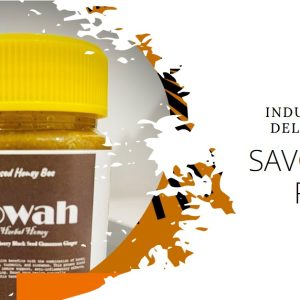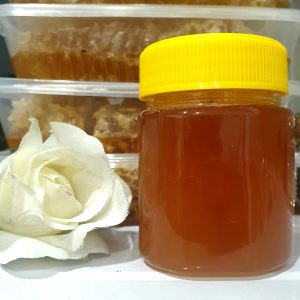
Honey, often referred to as “liquid gold,” has been a staple in human nutrition and medicine for centuries. Among the various types of honey available, raw honey stands out for its unique composition and potential health benefits. This essay aims to explore the fascinating world of raw honey, delving into its nutritional content, therapeutic properties, and the importance of choosing raw over processed honey.
Nutritional Composition of Raw Honey: Raw honey is a natural sweetener produced by bees from the nectar of flowers. Its nutritional composition is rich and diverse, containing essential vitamins, minerals, enzymes, and antioxidants. As aptly stated by the Harvard T.H. Chan School of Public Health, “Raw honey is a nutritional powerhouse, offering a range of health-promoting compounds” (Harvard Health Publishing, n.d.).
One of the key distinguishing factors of raw honey is that it is not subjected to the extensive processing that commercial honey undergoes. Heat and filtration processes often employed in conventional honey production can lead to the loss of valuable nutrients. In contrast, raw honey retains its natural goodness, including bee pollen, propolis, and beneficial enzymes.
Therapeutic Properties of Raw Honey: Beyond its delightful taste, raw honey has been recognized for its therapeutic properties. Harvard Health Publishing notes that raw honey possesses antimicrobial and anti-inflammatory properties, making it a potential remedy for wounds and minor burns (Harvard Health Publishing, n.d.). The presence of hydrogen peroxide, produced by the enzyme glucose oxidase, contributes to the honey’s ability to inhibit the growth of bacteria.
Moreover, raw honey has been linked to various health benefits, including soothing sore throats, alleviating allergies, and supporting digestive health. The diverse range of antioxidants in raw honey, such as flavonoids and polyphenols, may contribute to its anti-inflammatory and immune-boosting effects (Gheldof et al., 2002).
Choosing Raw Honey over Processed Varieties: While honey, in general, is celebrated for its sweetness, the choice between raw and processed honey can significantly impact its nutritional value. The heating and filtration processes involved in commercial honey production can diminish its enzyme activity and antioxidant content. As such, opting for raw honey ensures a more wholesome and nutrient-rich product.
Conclusion: In conclusion, raw honey emerges as a golden elixir, not just for its exquisite taste but for the myriad health benefits it offers. Harvard Health Publishing’s acknowledgment of raw honey as a “nutritional powerhouse” underscores its significance in promoting overall well-being (Harvard Health Publishing, n.d.). As consumers, choosing raw honey allows us to savor not only the sweetness on our palates but also the wealth of nutrients that nature intended.
References:
- Harvard Health Publishing. (n.d.). The sweet health benefits of honey. Harvard T.H. Chan School of Public Health. https://www.hsph.harvard.edu/nutritionsource/food-features/honey/
- Gheldof, N., Wang, X.-H., Engeseth, N. J. (2002). Identification and quantification of antioxidant components of honeys from various floral sources. Journal of Agricultural and Food Chemistry, 50(21), 5870–5877. https://doi.org/10.1021/jf0256135



Hi, this is a comment.
To get started with moderating, editing, and deleting comments, please visit the Comments screen in the dashboard.
Commenter avatars come from Gravatar.